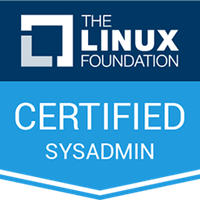 Operations Deployment25%
Operations Deployment25%
Diagnose, identify, manage, and troubleshoot processes and services
Manage or schedule jobs for executing commands
Search for, install, validate, and maintain software packages or repositories
Recover from hardware, operating system, or filesystem failures
Manage Virtual Machines (libvirt)
Configure container engines, create and manage containers
Create and enforce MAC using SELinux















